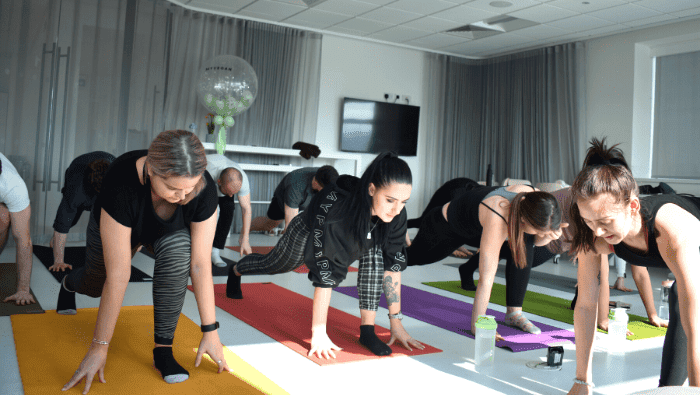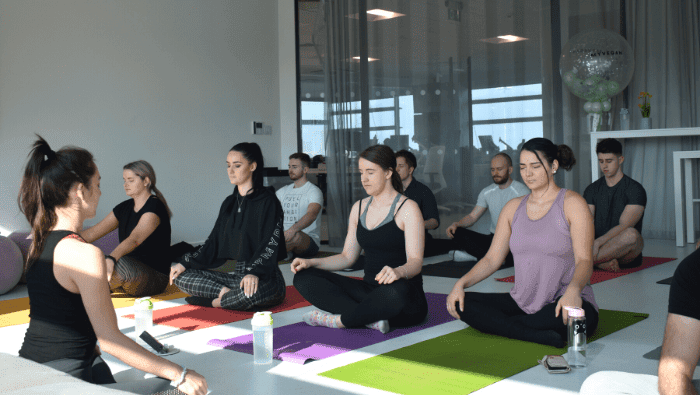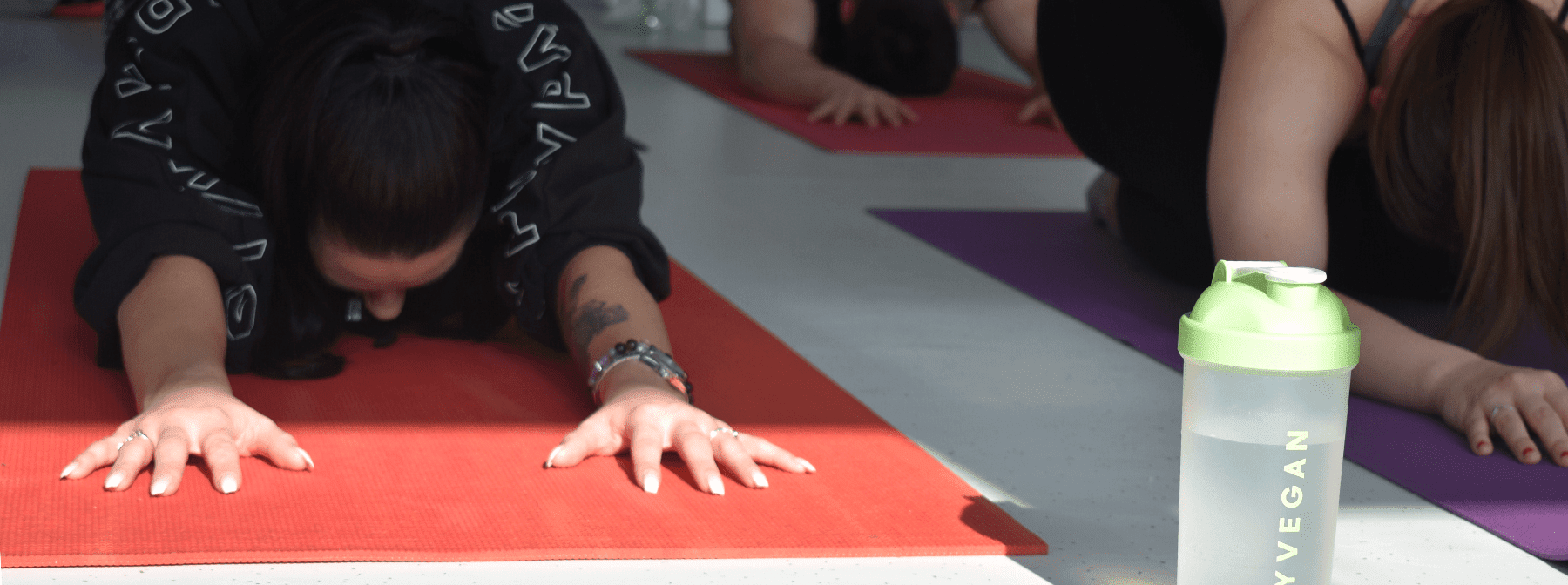
Given current events going on in the world, a lot of us will be spending much more time at home than usual.
This is the perfect time to focus on a little self-care, and what better way to do so than by practising a daily morning yoga routine? Yoga is an ancient form of exercise that combines strength and flexibility training with breathing techniques and meditation. The ultimate goal of regular yoga practice is to bring about a connection between your mind and body. This is becoming increasingly popular in a world where many people deal with the everyday stressors and mental health concerns associated with a fast-paced and highly connected lifestyle.
Yoga can be done at any time of day, depending on when you have the time, but given the fact a lot of us will be spending more time indoors, practising a bit of morning yoga might be just the thing to get you up and moving for the day ahead - regardless of whether you’re working from home or just lounging on the sofa in front of Netflix! Some traditional yoga practices, such as Ashtanga yoga, advocate doing morning poses or ‘asanas’ even before the sun has come up, however this belief has become more flexible in modern times to accommodate different schedules.
So, why is morning yoga specifically so good for us? Think about how good a big stretch feels when you get out of bed – this is because our muscles are temporarily paralysed when we enter the stage of sleeping known as REM sleep and stretching the muscles when we wake helps to reactivate them., One study suggests that just a 25 minute yoga workout could increase energy levels and improve brain function.2 However, it’s not just a boost of energy that you could benefit from with a little morning yoga either. Read on to discover four of the main reasons to start rolling out the yoga mat in the morning.

4 Benefits of Doing Yoga in the Morning
Improved Mental Health
During stressful times, it’s incredibly important to take care of our mental health as well as physical. There has been a lot of research into the benefits of yoga for mental health, particularly in regards to stress and anxiety. It’s been found that yoga can reduce the secretion of cortisol - AKA the “stress hormone”, as well as bring about reduced anxiety levels, so it a spot of morning yoga can be beneficial if you wake up feeling a bit tense.3
Top Tip: Whilst yoga is an amazing thing to do on your own for some introspection and self-love, you can find lots of benefits by sharing your practice with others. Do a joint yoga or mindfulness session with someone in your household, or online. There are some great communities on social media to share tips and motivation.
Yoga can be extremely useful if you suffer from anxiety. One study found that women who practiced yoga twice a week for two months had significantly reduced feelings of anxiety.4 The exact mechanisms for this is hard to pinpoint as yoga involves a combination of many different physical movements, meditation techniques and mindfulness. What we do know though, is that yoga promotes a relaxation response in the body, allowing it to gain a sense of calm.5 Plus, yoga practice includes a heavy emphasis on breathing techniques, which are commonly used as a way of alleviating stress and anxiety. The aspects of mediation and mindfulness can be particularly useful in the morning they help to focus the mind on specific goals for the day ahead, potentially helping to feel less stressed or anxious.
It could even be argued that there are benefits of yoga for depression too. Given that cortisol is known to reduce levels of serotonin - the “happy hormone” – means that the ability of yoga to reduce cortisol levels in the blood may be one of the reasons behind improved mood.6 Yoga teachings also puts a large emphasis on gratitude and focusing on things you are thankful for which helps to start the day with a positive mentality. A regular morning yoga session is definitely worth considering if you are looking to improve your mental well-being, both in the short-term and long-term.

Improves Flexibility, Strength & Balance
It’s not just the mental well-being that yoga benefits either. It’s also a great way to improve physical well-being including strength, balance and flexibility. Specific poses will target specific areas of the body, with most of them focusing on all three aspects of strength, balance and flexibility. In some cases, you can even find specific workouts or classes that focus on one of these areas in more depth.
Yoga isn’t just a form of exercise that can be practised on its own - it can also benefit you if you do other forms of exercise as well. One study into male athletes found that after 10 weeks of yoga practice, they had an increase in the measures of balance and flexibility, suggesting this could improve their overall performance in their sport.7 Likewise, another study into adults regularly performing a series of ‘sun salutation’ poses found an increase in their upper body strength as well as weight loss.8 Worth bearing in mind if you’re wanting to improve in these areas - yoga might just be the way forward!

Better Sleep
Exercise in general is often referred to as being beneficial for both our physical and mental health, including when it comes to sleep, but what does this mean when it comes to yoga? Yoga can help you in a number of ways including being able to fall asleep faster, sleeping for longer, as well as feeling more rested the following morning.9 This could be down to the fact that yoga stimulates the production of melatonin, the hormone that regulates your sleep-waking cycle.10
But is it better to do morning yoga or evening yoga if you want to improve sleep quality? There’s no right or wrong answer - it’s whatever works best for you and your schedule. Morning yoga is a great way to stretch out the muscles when you get out of bed, but evening yoga can help to ease away any stresses from the day and make it easier to “switch off” for the evening. While some professionals recommend either morning or early evening practice, the most important thing is making sure you can easily fit it in with your routine.11 This may mean waking up 15 minutes earlier each morning, for example.
Practice in the morning makes one work better at one's vocation. In the evening it removes the fatigue of the day's strain and makes one fresh and calm. - B.K.S Iyengar
Benefits for Heart Health
Looking after your heart is crucial to any healthy lifestyle, so we should all be doing our bit to keep it running smoothly. Some scientific studies have suggested that yoga could be beneficial for heart health and may even reduce some of the risk factors associated with heart disease, such as high blood pressure.12 For example, one study found a lower pulse rate and blood pressure in those who did yoga than those who didn’t.12 Another study even suggested that when combined with other aspects of a healthy lifestyle, such as stress management and positive dietary changes, yoga may even help towards slowing the progression of heart disease, although it is important to keep in mind that the different factors may influence the body at differing levels.13 However, if we take into account what we’ve already mentioned around yoga helping to reduce stress - a known contributing factor of heart disease14 - a little yoga may be a good idea for those wanting to take a few extra measures towards keeping the heart healthy.
Summary
Regardless of what time in the day you carry out your daily yoga practice, it’s clear that there are numerous benefits to be had by spending a little time down on the mat. A morning yoga session can be easily added into your normal daily routine and can help prepare both your mind and body for the day ahead – stretch the muscles, get the blood circulation moving, and focus your mind on the things you are grateful for.
There are plenty of ways that you can do yoga at home, with everything from dedicated apps to YouTube channels, providing a whole range of workouts for all levels. Why not take advantage of any extra time indoors and take up a regular morning yoga practice that may even work wonders for your health and well-being? Roll out your mat or head to the carpet and discover those benefits of a yoga session to start the day!
Enjoy and namaste.
Written by Amy Jackson – Content Writer at Promo Codes For
- University of Toronto. (2012, July 17). How muscles are paralyzed during sleep: Finding may suggest new treatments for sleep disorders. ScienceDaily.
- Luu, K., Hall, P.A. (2017). Examining the Acute Effects of Hatha Yoga and Mindfulness Meditation on Executive Function and Mood. Mindfulness 8, 873–880.
- h Rapid stress reduction and anxiolysis among distressed women as a consequence of a three-month intensive yoga program. Med Sci Monit. 11(12).
- Javnbakht, M., Hejazi Kenari, R., & Ghasemi, M. (2009). Effects of yoga on depression and anxiety of women. Complement Ther Clin Pract. 15(2):102-4.
- Star, K. & Gans, S. (2019). How Yoga Can Help Ease Anxiety and Panic Disorder Symptoms. com.
- Tafet, G. E., Idoyaga-Vargas, V. P., Abulafia, D. P., Calandria, J. M., Roffman, S. S., Chiovetta, A. & Shinitzky, M. (2001). Correlation between cortisol level and serotonin uptake in patients with chronic stress and depression. Cogn Affect Behav Neurosci. 1(4):388-93.
- Polsgrove, M. J., Eggleston, B. M., & Lockyer, R. J. (2016). Impact of 10-weeks of yoga practice on flexibility and balance of college athletes. Int J Yoga. 9(1): 27-34.
- Bhutkar, M. V., Bhutkar, P. M., Taware, G. B., & Surdi, A. D. (2011). How Effective Is Sun Salutation in Improving Muscle Strength, General Body Endurance and Body Composition? Asian J Sports Med. 2(4): 259-266.
- Manjunath, N. K., & Telles, S. (2005). Influence of Yoga and Ayurveda on self-rated sleep in a geriatric population. Indian J Med Res. 121(5): 683-90.
- Q&A: When Is the Best Time to Practice?: Cyndi Lee discuses is the best time of day—and year—to practice yoga. com. Updated Apr 12 2017.
- Bharshankar, J. R., Bharshankar, R. N., Deshpande, V. N., Kaore, S. B., & Gosavi, G. B. (2003). Effect of yoga on cardiovascular system in subjects above 40 years. Indian J Physiol Pharmacol. 47(2): 202-6.
- Yogendra, J., Yogendra, H. J., Ambardekar, S., Lele, R. D., Shetty, S., Save, M., & Husein, N. (2004). Beneficial effects of yoga lifestyle on reversibility of ischaemic heart disease: caring heart project of International Board of Yoga. J Assoc Physicians India. 52:283-9.
- Inoue, N. (2014). Stress and atherosclerotic cardiovascular disease. J Atheroscler Thromb. 21(5):391-401.









